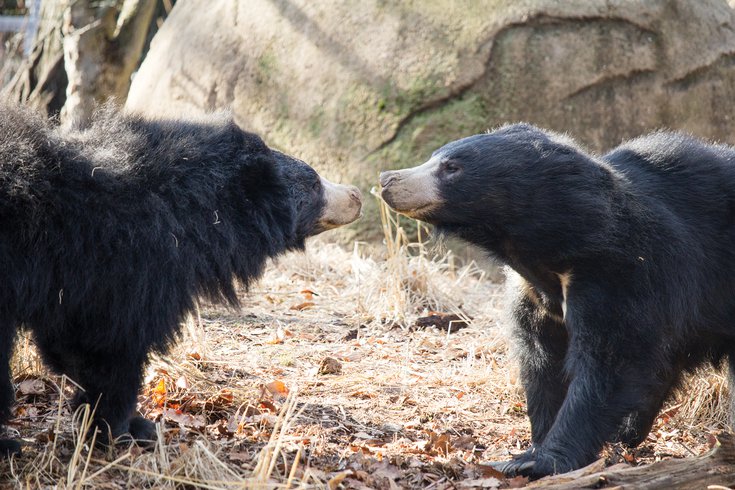
February 16, 2023
 Provided Image/Kory Aversa
Provided Image/Kory Aversa
Two sloth bear cubs were born at the Philadelphia Zoo in January. They and their parents, Kayla and Bhalu, pictured above, are members of a vulnerable species whose population has been declining for decades due to habitat loss and poaching.
The Philadelphia Zoo revealed the notable births of two sloth bear cubs on Thursday. The animals are members of a vulnerable species whose population has rapidly declined in recent decades. Zoo officials consider the newborn bears a win for animal conservation efforts.
The cubs were born at 3:53 a.m. and 4:16 a.m. on Monday, Jan. 2, to zoo's lone pair of adult sloth bears — 10-year-old female Kayla and 10-year-old male Bhalu. The birth of the cubs — whose names and sexes have yet to be released — marks the second successful birth of sloth bears at the Philadelphia Zoo in the last four years, and the first successful birth of a pair of sloth bear cubs at the zoo in the last 30 years, officials said.
Kayla and her cubs have been in constant physical contact since they were born, and have remained in a behind-the-scenes den, where their health and growth is being monitored by zookeepers. Visitors to the zoo will not get the chance to see the babies until at least April. That's when zoo officials estimate Kayla will decide it's time for the cubs to venture out of their private home.
"We are thrilled to start off 2023 with these successful births," Maggie Morse, the Philadelphia Zoo's curator of carnivores and ungulates, said in a release. "This was a collaborative effort from both our expert keepers and our veterinary team. Kayla has been trained by her keepers to do voluntary ultrasounds so we were able to keep the (Species Survival Plan) updated with news of a successful pregnancy."
The pregnancy and subsequent births happened in part due to the zoo's partnership with the Species Survival Plan, a breeding program at the Association of Zoos and Aquariums. It manages populations of threatened or endangered species across institutions in the association to help ensure the long-term genetic and demographic survival of species and protect them from extinction.
When the sloth bear cubs emerge, they will join their mother and father in an exhibit in Bear Country, which will be available to the public later this year.
We have some BEARY EXCITING news to share with you! 🐻🐻 You're looking at the two newest members of our Zoo family. These precious and healthy sloth bear cubs were born to 10-year-old mom Kayla and 10-year-old dad Bhalu on January 2. 🧵 1/4 pic.twitter.com/VfCWGcYMyV
— Philly Zoo (@phillyzoo) February 16, 2023
Sloth bears are native to the lowland forests of India, Sri Lanka and Nepal, and are listed as "vulnerable" by the International Union for Conservation of Nature. Populations have decreased during the last several decades due to habitat loss, poaching and human-wildlife conflict.
Sloth bears characterized by their flexible snouts with protruding lips. The have powerful lungs that allow them to dislodge and eat termites and ants living up to 10 feet underground.
They can close their nostrils to ensure that no bugs travel into their noses while foraging for food. Sloth bears also also frequently eat fruit, flowers and honey. They are solitary, nocturnal creatures, and their chests are typically marked with a whitish markings that resemble the letter V or Y.
The gestation period for sloth bears is four to seven months, after which the mother gives birth to about two cubs in an underground den. The father does not participate in the birth, and is frequently not even nearby in the wild when his cubs are born.
Much like Kayla with her cubs, a newborn sloth bears relies entirely on its mother for the first several months of its life. A cub dooes not emerge from the birthing place until it has already learned to walk on its own. Unlike other bears, a sloth bear cub will ride on its mothers' back by clinging to her fur, and it will remaining with her for two or three years before going out on its own.
Philadelphia Zoo officials said they will sharing the cubs' developmental milestones with the public over the next several months, and currently, Kayla and her cubs are all in good health. For regular updates on the cubs' progress, check out the Philadelphia Zoo on Instagram.